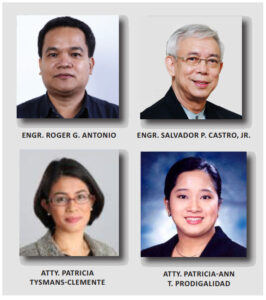 Japan International Cooperation Agency (JICA) has released the official results of the Fédération Internationale Des Ingénieurs-Conseils (FIDIC) Dispute Board Adjudicator Assessment Workshop, which was held last November 5-7, 2012. In the first of its four assessment batches, the FIDIC Assessment Panel has declared 11 candidates to have passed the FIDIC examinations: four from the Philippines, two from Vietnam, two from Indonesia, and three from Sri Lanka.
Japan International Cooperation Agency (JICA) has released the official results of the Fédération Internationale Des Ingénieurs-Conseils (FIDIC) Dispute Board Adjudicator Assessment Workshop, which was held last November 5-7, 2012. In the first of its four assessment batches, the FIDIC Assessment Panel has declared 11 candidates to have passed the FIDIC examinations: four from the Philippines, two from Vietnam, two from Indonesia, and three from Sri Lanka.
Of the 11 who passed, two were lawyers while the rest were engineers. The successful examinees from the Philippines were Attys. Patricia Ann T. Prodigalidad and Patricia Tysmans-Clemente, both members of the Philippine Dispute Resolution Center, Inc. (PDRCI), and Engrs. Salvador P. Castro, Jr. and Roger G. Antonio. Engr. Castro is a Trustee of PDRCI.
Attys._Prodigalidad_and_TysmansClemente are law partners at Angara Abelo Concepcion Regala & Cruz and part of its Litigation and Dispute Resolution Department.
Engr. Castro, Jr. is the founding chair and president of SPCastro, Inc. and an Affiliate Member and International Accredited Trainer of FIDIC. He is also the Philippine representative of the Dispute Resolution Board Foundation. Engr. Antonio is a director at SPCastro, Inc. and vice president and head of its Special Projects Division.
As accredited FIDIC Adjudicators, the successful candidates will be included in the list of exclusive adjudicators for disputes involving FIDIC contracts.
On a related matter, the newly organized Shanghai International Economic and Trade Arbitration Commission, also known as the Shanghai International Arbitration Center (SHIAC), has accredited PDRCI Trustees Atty. Eduardo R. Ceniza, Atty. Edmundo Tan, Atty. Jose Aguila Grapilon and PDRCI President Victor P. Lazatin as arbitrators for the term starting May 2013 through April 2015. Attys. Ceniza, Tan, Grapilon and Pres. Lazatin are the first Filipinos to be included in the SHIAC Panel of Arbitrators composed of close to 1,000 professionals, who are experts in arbitration or in specialized trades.
This is custom heading elementDispute Boards:
East vs West
 In Part I, the author discussed education and cost as two of the problem areas limiting the widespread use of Dispute Boards outside the United States. In Part II of the article, the author
In Part I, the author discussed education and cost as two of the problem areas limiting the widespread use of Dispute Boards outside the United States. In Part II of the article, the author
discusses philosophy as the third problem area and the efforts being done to overcome such problems.
Philosophy: In many countries, there is a resistance to the FIDIC philosophy that the decision of its Dispute Adjudication Board must be immediately binding on the contract parties, who must implement it forthwith even if one (or both) parties have given a Notice of Dissatisfaction and intention to refer the dispute to arbitration. The background to the FIDIC philosophy can be found in the history of its first and still predominant set of Conditions of Contract, the Red Book, for use in construction where the works are designed by other than the contractor.
Until the 4thEdition of the FIDIC Red Book, disputes were decided by the Engineer and the decisions of the Engineer could not be referred to arbitration until after completion of the contract works. Although the 4th Edition, first published in 1987, introduced the ability of a party to initiate arbitration during construction, the Engineer’s decision still was binding and both parties were contractually bound to abide by it unless and until it was altered in arbitration.
In 1996, when the Supplement to the 4th Edition appeared, introducing the Dispute Adjudication Board (DAB) as an alternative decider of disputes under the Red Book, the decision of the DAB was May 2013 given the same contractually-binding status as the decision of the Engineer. The rationale behind this philosophy is that the progress of construction must be paramount and thus the parties must follow the decision of the Engineer or the DAB, even if that decision were later altered in arbitration.
This philosophy has met with resistance in many countries. Employers facing a decision requiring payment of a large sum of money have simply refused to comply unless and until a final award is issued by an arbitral tribunal. Efforts have been made to obtain court injunctions to force compliance with a DAB decision, or to obtain an Interim arbitral award requiring compliance prior to Final Award, only to discover that under the applicable law, no such temporary or interim enforcement of the DAB decision can be obtained so long as the ultimate validity of the DAB decision is subject to a Final Award of the arbitral tribunal, or to a final decision of a court of law.
However, this overview of Dispute Board problems in the East would be misleading if it did not mention hopeful efforts which are afoot to overcome the challenges of education, cost, and philosophy.
Education: The Japan International Cooperation Agency (JICA) has become a leader among the development lenders in two respects. First, it is adopting a consistent policy of treating the cost of Dispute Boards as eligible for financing by JICA. Second, it is financing and executing a training program for effective use of Dispute Boards in those Southeast Asian countries in which it is most active.
This training program is being developed in collaboration with the national Member Associations of FIDIC, and the Dispute Resolution Board Foundation. In-country training programs are operated to educate users on the FIDIC MDB Harmonised Conditions for Construction, which are being adopted by JICA for use on contracts it finances. Also, additional in-country training workshops are being conducted for persons who wish to serve on Dispute Boards, followed by evaluation workshops, leading to identification of persons recommended for listing by the local member association of FIDIC as approved candidates for appointment to Dispute Boards.
JICA has developed the interest of the Asian Development Bank, and more recently, the World Bank in establishing similar training programs in other countries. These programs not only help in effective use of Dispute Boards but also enable creation of Boards using in-country members, thus reducing reliance on foreign members and reducing the cost of Dispute Boards.
